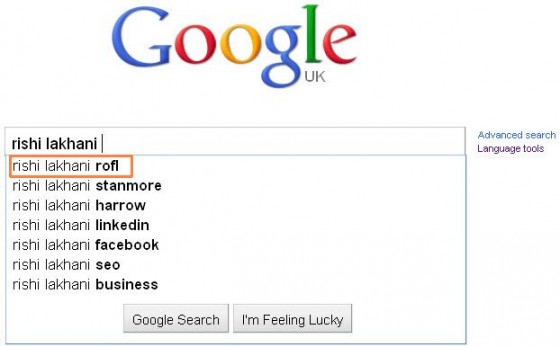Google Instant launched six months ago, back in September of 2010 and has already had an impact on SEO and user search behavior. There has been a lot of speculation in the SEO community about whether the instant search auto-complete can be manipulated, and what Google uses as signals to populate it’s Google Instant search suggestions, with a lot of debate about whether search volume is actually a factor.
Rishi Lakhani did some testing and proved that yes, search volume affects Google Instant search suggestions. And in doing so, he also proved that Google Instant search could be manipulated. He asked his Twitter followers to type his name into Google, and then add on “ROFL” after it. Having an uncommon name, it didn’t require millions of searches before he saw a result:
Many other SEOs have done similar experiments and managed to get similar phrases popping up in Google Instant search — though some of them only locally, or only for shorter segments of time. So it is very clear that not only is search volume a factor (and apparently an important one) but it’s possible for black hat SEO to manipulate the instant auto-complete suggestions. This has disturbing implications.
Negative Implications of Manipulation of Google Instant Search
Imagine for a moment that you want to buy a cowboy hat, and you heard that Bill’s Cowboy Emporium was a good online place to buy them. So you go to Google and type in Bill’s Cowbow Emporium — but then you see the instant search suggestions, one of which is “Bill’s Cowboy Emporium Scam” or “Bill’s Cowboy Emporium Defrauds Customers.”
These are the kinds of instant search results that will cause a user to change their search behavior — they were planning on just finding the website, but now they’re alarmed and wan to know about this scam! And this is exactly the dangerous potential that manipulating Google Instant search represents.
It’s theoretically possible for unethical competition to manipulate Google Instant search for your site and put false negative terms into the instant suggestions. This is likely only going to happen in an arena for which there are comparatively few searches — the number of search queries needed to alter an instant result for “shoes” for example, would likely be unobtainable. But for more niche industries, or terms including a smaller company name… well testing has proved that it’s possible, and frankly there’s not a whole lot you can do about it, other than report it to Google, cross your fingers, and hope.
Manipulating Google Search is Solidly Black Hat SEO
It’s worth stressing here, if it wasn’t already obvious, that attempting to manipulate Google Instant search suggestions is against Google’s guidelines, and Google could theoretically punish your site for doing so (assuming they could link you to a site).
As with most Google exploits, any attempt to chase after this one is probably not worthwhile. Even if you do manage to get enough volume of searches from across all different areas and IP addresses, and even if you manage to avoid getting caught (or reported) by Google — it’s likely that as they tweak their instant search auto-complete algorithm you’ll quickly lose those instant suggestions. After all, with the very public examples of people manipulating their auto-complete I’ve no doubt that Google is working on tweaks right now.







